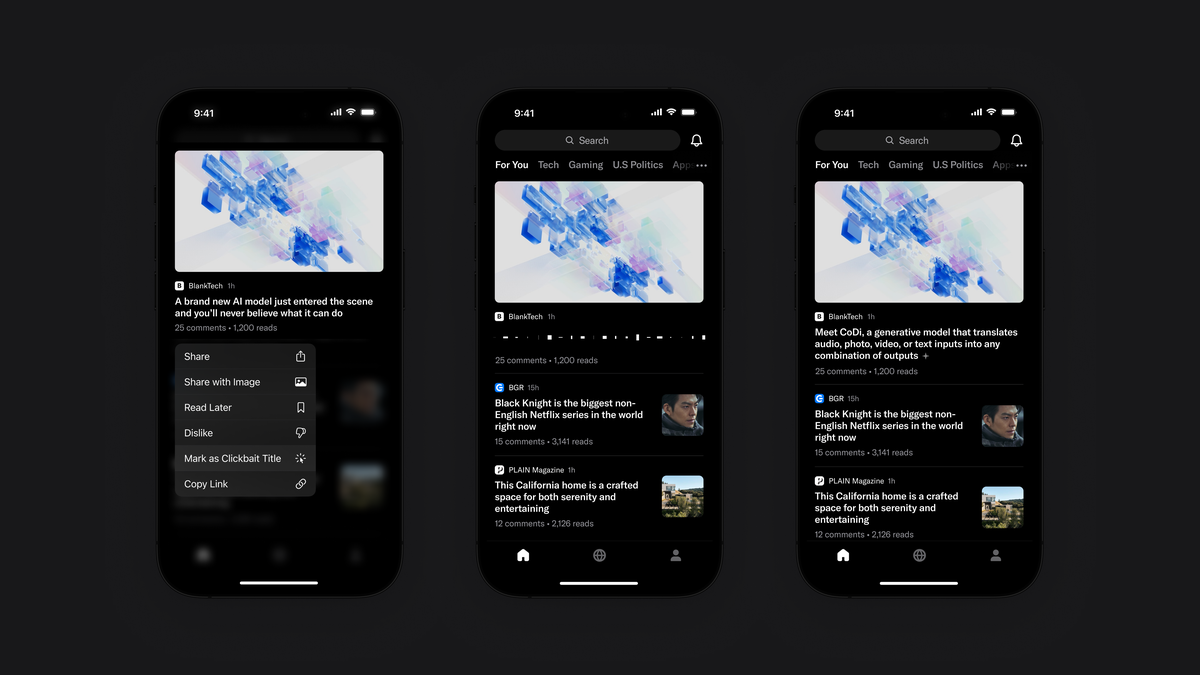
Tired of search engine optimization run amok? After allowing users to flag some articles as clickbait, the Artifact news app now says it wants users to mark clickbait headlines they come across so it can rewrite the title text using AI. Hell, if enough users also report the same headline, Artifact will then display that AI-generated headline to all users at once.
On Friday, the AI-driven article recommendation app said it would let news hounds use an AI based on OpenAI’s GPT-4 large language model to rewrite a crappy “You’ll Never Believe What Happened Next” headline into something far more legible and indicative of the information in the article.
One example Artifact showed in the image above is the headline A brand new AI model just entered the scene and you’ll never believe what it can do. After selecting “Mark as Clickbait Title” in a dropdown menu, the AI changed it to Meet CoDi, a generative model that translates audio, photo, video, or text inputs into any combination of outputs.
The app should mark AI-generated titles with a “special icon” to notify the headline was changed. Artifact also claimed that it is working on automatically detecting clickbait titles without relying on user reports. The app launched earlier this year and was created by former Instagram co-founders Kevin Systrom and Mike Krieger as a simplified news aggregator, almost like TikTok but for text. Other updates have added reputation scores to user profiles based on their comments on articles.
Here’s a little peek behind the curtain: few journalists enjoy writing SEO-optimized clickbait headlines. The ever-present demands for traffic has created a mass conflagration of potentially misleading headlines made to drive Google search results. We would like to write quippy and fun headlines that really let us show our personality, but doing so means that in this SEO-driven world the article is much less likely to be seen.
Systrom told The Verge that a team of real-life humans would review some of the most-changed headlines to push a rewritten title to all users. The Artifact co-founder said that while he has encountered situations where a rewrite wasn’t exactly necessary, the generated headline wasn’t “necessarily better, but it’s not worse.”
Still, we haven’t yet seen what the Artifact AI might interpret as a “clickbait” headline. Let’s use a few of my own as an example. You could debate whether my Eating Disorder Helpline Takes Down Chatbot After Its Advice Goes Horribly Wrong story is clickbait because I’m not revealing exactly what advice the chatbot offered, though I’d argue the title is fully indicative of how messed up the AI could be talking to people in severe emotional distress. How about my story This ‘Companion’ AI Chatbot Convinced Me to Find a Therapist? On its face, you might assume it’s an article that’s fully derisive about AI or even the act of finding emotional help, but the truth is the story is about sharing my own compunctions with chatbots, while also having a legitimately wholesome interaction with an AI.
As a journalist and a writer, I’m not nearly as beholden to my headlines as I am to the text contained in the article. There are plenty of reasons for us writers to be concerned with the proliferation of AI, especially as some online outlets like CNET have used AI to write stories without notifying readers or even other staff at the publication. There’s no industry-wide standard for journalists’ use of AI, whether it’s in an assistant role or for generating text, which will be a major problem in the coming months and years.
Artifact’s new feature is helpful to a large degree, but it’s a good reminder that while an AI can potentially clarify information in an article, it’s far more capable than any human outfit of flooding the internet with shitty, innocuous clickbait.
Credit : Source Post





